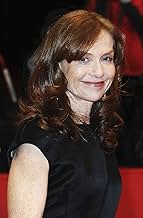VALUTAZIONE IMDb
6,5/10
2082
LA TUA VALUTAZIONE
Aggiungi una trama nella tua lingua1760s France. Suzanne is shocked when her bourgeois family sends her to a convent. There she faces oppression and torment, leading her to fight back and expose the dehumanizing effect of clo... Leggi tutto1760s France. Suzanne is shocked when her bourgeois family sends her to a convent. There she faces oppression and torment, leading her to fight back and expose the dehumanizing effect of cloistered life.1760s France. Suzanne is shocked when her bourgeois family sends her to a convent. There she faces oppression and torment, leading her to fight back and expose the dehumanizing effect of cloistered life.
- Regia
- Sceneggiatura
- Star
- Premi
- 1 vittoria e 6 candidature totali
Recensioni in evidenza
I am a fan of Diderot by way of Rousseau. And his novel was interesting in the letter based structure. It quite forward thinking for its time, in that while the Enlightenment was directly challenging many statistic and institutional ideas, very few Enlightenment writers were including women in their considerations.
That said the user reviews here and especially the professional reviews are a bit overwrought as a result of leaving out context. Firstly almost all people were locked into vocation, virtually never of their own choosing, as everything about their life. Certainly married women were, and subject to control and violence that makes anything in "The Nun" pale by comparison. So too was just about anyone else for most of human history. Either overtly owned or tied to the land and their "station' and subject to warlord or state violence for for chalking that. Certainly in mid/late 18h century Nuns were eating better (no small thing in world were people regularly starved to death), were safer in almost every way than most other people, certainly than the great majority of men, who were much more likely to be inducted into the military as cannon fodder.
Again, the 1966 version is better, and better yet is the novel.
That said the user reviews here and especially the professional reviews are a bit overwrought as a result of leaving out context. Firstly almost all people were locked into vocation, virtually never of their own choosing, as everything about their life. Certainly married women were, and subject to control and violence that makes anything in "The Nun" pale by comparison. So too was just about anyone else for most of human history. Either overtly owned or tied to the land and their "station' and subject to warlord or state violence for for chalking that. Certainly in mid/late 18h century Nuns were eating better (no small thing in world were people regularly starved to death), were safer in almost every way than most other people, certainly than the great majority of men, who were much more likely to be inducted into the military as cannon fodder.
Again, the 1966 version is better, and better yet is the novel.
... given the age of the story - but this disappoints on other fronts as well.
Firstly, the Dickensian "let's drag everyone through misery until the deus ex machina ending" is just too well-worn for me, but could have been OK if the execution were more interesting on the way. Sadly, I was bored quite often, waiting for something to happen (or just not to see again something already well-signposted) and some of the acting (sadly including Huppert's turn here) was just not very convincing.
Ultimately, a nicely-shot but (for me) too-familiar tale of the crushing power of systems and the risks of resistance. Others may have more fun with it.
Firstly, the Dickensian "let's drag everyone through misery until the deus ex machina ending" is just too well-worn for me, but could have been OK if the execution were more interesting on the way. Sadly, I was bored quite often, waiting for something to happen (or just not to see again something already well-signposted) and some of the acting (sadly including Huppert's turn here) was just not very convincing.
Ultimately, a nicely-shot but (for me) too-familiar tale of the crushing power of systems and the risks of resistance. Others may have more fun with it.
In 1966 ,when the first version of Diderot's novel was released, there was an outcry :the Church insisted that the movie be called "Suzanne Simonin,la religieuse de Diderot ". Half a century later ,history did not repeat. The Catholic Church has seen worse.
Nicloux 's remake is not in the least inferior to Rivette's work ; it's downright different from it ,and with the exception of Micheline Presles, has a more convincing cast : Pauline Etienne, in the tradition of Catherine Mouchet ("Thérèse") , is a more credible tormented nun than the beautiful but inexpressive Anna Karina ; she shines in the scene of her vows where one feels her confusion and her human hesitations .Ditto for Isabelle huppert ,one of the best living French actresses,who effortlessly outshines Liselotte Pulver in the thankless part of the homosexual mother superior who falls madly in love with unfortunate Suzanne who has not got a clue but knows that there's something wrong in this ,to put it mildly, disconcerting relationship .Nicloux smartly uses the old French ditty from the seventeenth century "Mon Père M'a Donné Un mari" (= my father gave me a husband) , which denounced the drama of the numerous daughters married against their will .When the lesbian mother superior reprises the song , she identifies herself at Suzanne's husband ;Huppert is only supporting ,but she blows everyone off the screen in her scenes.
Neither Rivette nor Nicloux was faithful to the end of the novel : after escaping from the convent ,the heroine was desperately looking for a job as a governess or a simple servant in a castle ;the book ends with a PS that augurs badly .The former director gave a pessimistic tragical denouement.
Nicloux ,on the other hand ,developped an aspect of the novel : Suzanne is an illegitimate child ; Diderot who was an atheist , made the mother a hypocrit who thought that,by giving her daughter as an offering to God, she was able to wash her sin away. Some space is given over to this affair which leads to a (relatively) optimistic conclusion : the wonderful pictures of the nature in the last sequences,sharply contrast with the place were Suzanne was "buried alive".
Nicloux 's remake is not in the least inferior to Rivette's work ; it's downright different from it ,and with the exception of Micheline Presles, has a more convincing cast : Pauline Etienne, in the tradition of Catherine Mouchet ("Thérèse") , is a more credible tormented nun than the beautiful but inexpressive Anna Karina ; she shines in the scene of her vows where one feels her confusion and her human hesitations .Ditto for Isabelle huppert ,one of the best living French actresses,who effortlessly outshines Liselotte Pulver in the thankless part of the homosexual mother superior who falls madly in love with unfortunate Suzanne who has not got a clue but knows that there's something wrong in this ,to put it mildly, disconcerting relationship .Nicloux smartly uses the old French ditty from the seventeenth century "Mon Père M'a Donné Un mari" (= my father gave me a husband) , which denounced the drama of the numerous daughters married against their will .When the lesbian mother superior reprises the song , she identifies herself at Suzanne's husband ;Huppert is only supporting ,but she blows everyone off the screen in her scenes.
Neither Rivette nor Nicloux was faithful to the end of the novel : after escaping from the convent ,the heroine was desperately looking for a job as a governess or a simple servant in a castle ;the book ends with a PS that augurs badly .The former director gave a pessimistic tragical denouement.
Nicloux ,on the other hand ,developped an aspect of the novel : Suzanne is an illegitimate child ; Diderot who was an atheist , made the mother a hypocrit who thought that,by giving her daughter as an offering to God, she was able to wash her sin away. Some space is given over to this affair which leads to a (relatively) optimistic conclusion : the wonderful pictures of the nature in the last sequences,sharply contrast with the place were Suzanne was "buried alive".
If it were up to her that is. Bad jokes aside, this is based on a novel that has already seen an incarnation (no pun intended) in movie that was made in the sixties. I can neither relate to that movie or the book, since I haven't read or watched those. But I can say that I can relate to our main character here. And who would not be able to? Being forced to do something you don't want to, is something everyone has had to go through in different variations.
I do wonder what the church is saying about this, although it's obvious that the blame goes to single persons instead of everyone. The structure is pretty neat, with someone reading what happened and us being thrown into that mix. Great sets and costumes and a very well acted (underplayed) main role. Sometimes the devil is in the detail ...
I do wonder what the church is saying about this, although it's obvious that the blame goes to single persons instead of everyone. The structure is pretty neat, with someone reading what happened and us being thrown into that mix. Great sets and costumes and a very well acted (underplayed) main role. Sometimes the devil is in the detail ...
La religieuse is an interesting account of the life of the recluse who seeks a life of serenity, away from the distraction of the world only to find themselves amind cruel, pitiless and sadistic individuals who use religion and the name of God as an excuse to inflict pain on others. Prior to watching this adaptation, I have read few pages of Diderot's novel, and I can say that the movie does justice to the work, and now that I am continuing the reading, I can vividly picture the scenes of the movie, along with Pauline Etienne who gives life to the character of Suzanne Simonin, as i read through the pages.
Lo sapevi?
- QuizThe French sister Suzanne is played by Pauline Etienne, who was born in Belgium. In La storia di una monaca (1959), a similar movie based on the real life story of a Belgian nun who also wants to leave her convent, Sister Luke is played by Audrey Hepburn who was also born in Belgium.
- BlooperMad nun Sister Bénédicte pronounces the Latin sentence "Noli me tangere" ('Touch me not', John 20:17) with the reconstructed Classical Latin pronunciation, which was not used by the Catholic Church those days.
- ConnessioniFeatured in Dopo l'amore (2016)
- Colonne sonoreStabat Mater
Composed by Antonio Vivaldi
I più visti
Accedi per valutare e creare un elenco di titoli salvati per ottenere consigli personalizzati
- How long is The Nun?Powered by Alexa
Dettagli
- Data di uscita
- Paesi di origine
- Sito ufficiale
- Lingue
- Celebre anche come
- The Nun
- Luoghi delle riprese
- Bronnbach Monastery, Baden-Württemberg, Germania(Suzanne entering convent as noviciate)
- Aziende produttrici
- Vedi altri crediti dell’azienda su IMDbPro
Botteghino
- Lordo in tutto il mondo
- 503.090 USD
- Tempo di esecuzione
- 1h 52min(112 min)
- Colore
- Mix di suoni
- Proporzioni
- 1.85 : 1
Contribuisci a questa pagina
Suggerisci una modifica o aggiungi i contenuti mancanti


![Bande-annonce [OV]](https://m.media-amazon.com/images/M/MV5BNDczODNmYWEtOTRkMi00YzQ1LWEwMTEtZTM2NjIzYmY3MzE2XkEyXkFqcGdeQXRyYW5zY29kZS13b3JrZmxvdw@@._V1_QL75_UX500_CR0)


































